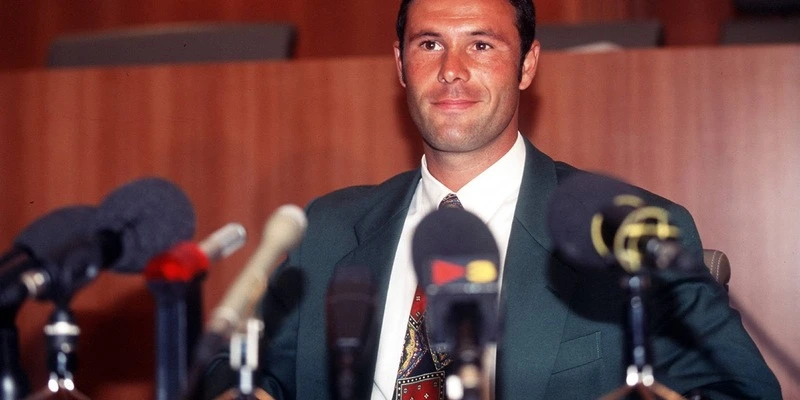What is Bosman in Football? The Bosman ruling changed the face of world football, simultaneously helping players earn more money and play for their beloved teams. So, what is Bosman in football? Let’s find out in detail in the article below.
What is Bosman in Football?
Football experts Carlos Vortex say that Bosman, or the Bosman ruling, is one of the century’s laws that has had a huge impact on European football. Accordingly, this law allows players to leave their parent club for free after their contracts expire. This ruling came into effect on December 15, 1995, and is associated with the name of Belgian footballer Jean-Marc Bosman.

Before the Bosman ruling, clubs had the right to control player transfers even after their contracts had expired. Specifically, the previous transfer law stipulated that clubs from a certain country had to have the consent of another club if they wanted to sign a player from their country, even if that player’s contract had expired. This caused legal issues and reduced the freedom of players.
And when the Bosman ruling was introduced, it completely changed the player transfer market. So, what is Bosman? The new regulations from the Bosman ruling not only allowed players to be transferred for free but also ended the system of foreign player quotas that UEFA applied to clubs participating in European cups, which limited them to a maximum of 3 foreign players in their squad. And this created a major turning point for clubs, with Manchester United known as the clearest beneficiary.
History of the Bosman Ruling in Football
The Bosman ruling is named after Belgian footballer Jean-Marc Bosman. Specifically, Bosman was a player for Liege Club in the Belgian national league but was suspended for not renewing his contract with his parent club in 1990. It is known that he wanted to find an opportunity to play for another club in Europe but faced extremely strict transfer regulations at the time.

In 1990, Jean-Marc Bosman filed a lawsuit with the European Court of Justice and requested a free transfer. However, the court ordered him to sign a new contract with Liege if he wanted to continue playing. Bosman refused this and insisted on a free transfer when his contract expired.
According to those familiar with the English Premier League top scorers, after a long period of debate, in December 1995, the European Court of Justice issued a final ruling stating that clubs managing players by not allowing them to find a new destination violated the players’ freedom of movement within the EU and was also illegal. With this ruling, after a contract with the managing club expires, the player can be transferred to any team in the EU without a transfer fee.
Since then, the Bosman ruling has been officially adopted and has completely changed the player transfer market. Accordingly, clubs no longer have to pay transfer fees to the former club if the player has terminated their contract with them. At the same time, players also have the right to a free transfer without the permission of their former club.
Advantages and Disadvantages of the Bosman Ruling
It can be said that Jean-Marc Bosman’s victory in the 1995 lawsuit had a major impact on the regulations in national leagues across Europe. So, let’s look at some of the positive and negative impacts of the Bosman ruling.
Advantages of the Bosman Ruling
- With the Bosman ruling, clubs can also be more flexible in using foreign players in their squads.
- After the Bosman ruling was applied, clubs had to change their approach to buying and selling players, as well as develop youth player training programs.
- Increased freedom for players after their contract with a club expires. Accordingly, players are free to transfer to their favorite club.
- The Bosman ruling also helps clubs reduce financial pressure when transferring players.
- In addition, this law also allows clubs to have more slots for foreign players to compete. Accordingly, clubs can buy players from any country to improve the quality of their team.
- The Bosman Act also helps increase the commercial value of the game as clubs can buy more players from different countries. This contributes to creating opportunities for sponsors and partners.
Disadvantages of the Bosman Rules
However, the Bosman ruling also has some limitations and negative impacts. One of the first consequences is that wealthy clubs can spend a lot of money to buy the best players, which creates a large gap between teams and invisibly affects the fairness of football.
The Bosman ruling was born to help big clubs easily own quality contracts with the best players. For example, Liege Club, before the Bosman ruling, was not inferior to Chelsea in the European arena. However, when the Bosman ruling came into effect, they became small in reputation, finance, and expertise.

Another disadvantage of the Bosman rule is that it reduces the quality of leagues. Because when big clubs have financial potential, they can buy the best players, while small clubs do not have many opportunities to compete. This has created a large gap between teams, making the league less attractive.
The Bosman ruling also affects the development and training of young players. Clubs tend to use experienced players and foreign players to meet immediate needs, instead of investing in the development of young players. This has limited opportunities for young talents to play and develop.
Hopefully, through the above information, you have a better understanding of what Bosman is in football as well as its impact on the development of the king sport.
>> Read more: Win Big at JILI777 Casino 2025

A seasoned online game expert at JILI777 Casino, with 5+ years of online sports betting and casino games experience. It’s my purpose to assist players with the greatest playing strategies, limited-time offers, and premium slot experiences. JILI777 operates based on fairness, security, and member satisfaction, guaranteeing an enjoyable and rewarding experience for all members. We appreciate your visit to JILI777 Casino as your online playground.
